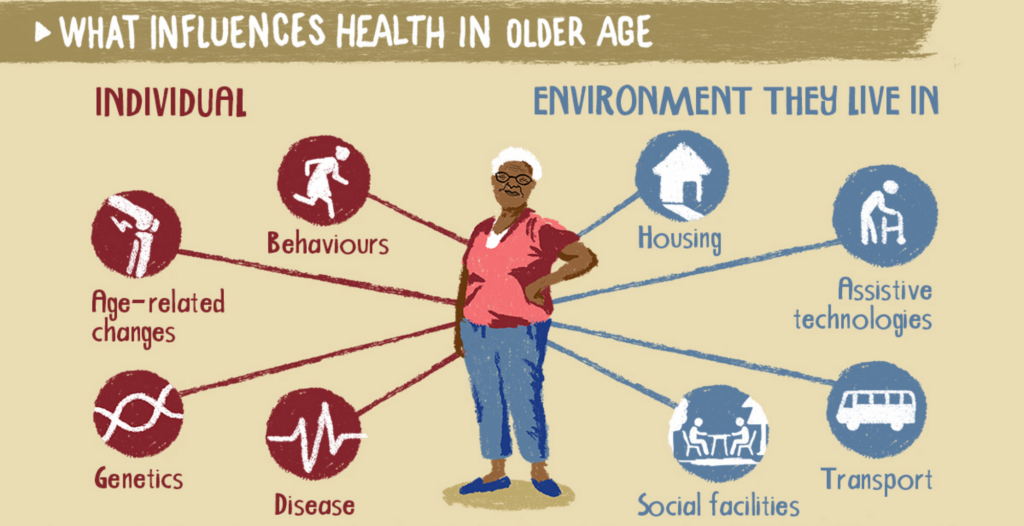
As individuals age, maintaining social health becomes increasingly important for overall well-being and quality of life. Social health refers to the ability to form meaningful relationships, engage in social activities, and maintain a support network that promotes emotional and psychological resilience. For aging populations, social connections play a crucial role in combating loneliness, reducing isolation, and supporting mental health. This essay explores effective strategies to promote social health among aging populations, highlighting the benefits of social engagement and suggesting practical approaches to enhance social connectedness.

Benefits of Social Health for Aging Populations
- Reduced Loneliness and Isolation: Social connections provide emotional support, companionship, and a sense of belonging, which are essential for reducing feelings of loneliness and isolation among older adults. Regular social interactions can help mitigate the negative impact of social isolation on mental health and well-being.
- Enhanced Cognitive Function: Engaging in social activities, conversations, and cognitive stimulation through social interactions can help maintain cognitive function and delay cognitive decline in aging adults. Social engagement stimulates the brain, promotes mental agility, and supports memory retention.
- Improved Physical Health: Strong social networks have been linked to better physical health outcomes among older adults, including lower rates of chronic diseases, improved immune function, and faster recovery from illness or surgery. Socially active individuals are more likely to adhere to healthy behaviors and engage in physical activities.
- Emotional Resilience: Social relationships provide emotional support during life transitions, grief, and challenging circumstances. Maintaining close connections with friends, family members, and peers can enhance emotional resilience, coping skills, and overall psychological well-being in older adults.
Strategies to Promote Social Health Among Aging Populations
- Community Engagement Programs: Develop community-based programs that encourage older adults to participate in social activities, recreational classes, and volunteer opportunities. Community centers, senior clubs, and local organizations can offer social events, group outings, and cultural activities tailored to the interests and preferences of older adults.
- Intergenerational Programs: Facilitate intergenerational activities that promote interaction between older adults and younger generations, such as mentoring programs, reading partnerships, or joint arts and crafts projects. These programs foster mutual understanding, bridge generational divides, and create opportunities for meaningful connections.
- Technology and Digital Literacy: Provide older adults with access to technology training and digital literacy programs to help them stay connected with family members, friends, and community resources through email, social media, video calls, and online forums. Virtual social platforms can facilitate social interactions and combat social isolation, especially for those who are homebound or living in remote areas.
- Supportive Housing and Aging-in-Place Initiatives: Create age-friendly environments and supportive housing options that promote social engagement, independence, and community participation. Design residential facilities with communal spaces, recreational amenities, and social activities that encourage residents to interact, socialize, and build supportive relationships with peers.
- Peer Support and Counseling Services: Establish peer support groups, counseling services, and wellness workshops that address the unique social and emotional needs of older adults. These programs provide opportunities for sharing experiences, receiving emotional support, and learning coping strategies for life transitions, grief, or health challenges.
- Promotion of Lifelong Learning: Offer educational programs, lifelong learning courses, and discussion groups that cater to the intellectual interests and curiosity of older adults. Learning opportunities promote mental stimulation, encourage social engagement, and provide platforms for exchanging ideas and knowledge with peers.
- Family and Caregiver Involvement: Involve family members, caregivers, and loved ones in promoting social health among older adults by encouraging regular visits, maintaining open communication, and supporting participation in social activities. Foster a supportive network of caregivers and volunteers who can provide companionship and emotional support to aging individuals.
Conclusion
Promoting social health among aging populations requires a multifaceted approach that addresses the diverse social, emotional, and practical needs of older adults. By fostering social connections, providing opportunities for engagement, promoting digital literacy, and creating supportive environments, communities can enhance the social well-being and quality of life for older adults. Empowering aging populations to remain socially active, connected, and involved in their communities not only supports their individual health and happiness but also strengthens community resilience and cohesion across generations. Let us continue to prioritize social health strategies that promote inclusive and age-friendly environments where older adults can thrive socially, emotionally, and physically.
